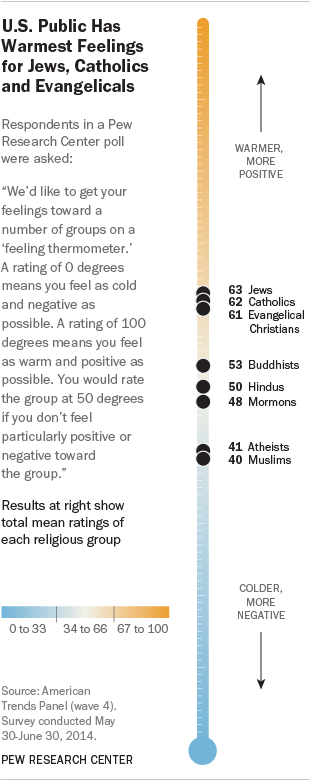While I’ve lived in the United States for quite some time now it continues to perplex. It may still be a land of opportunity, but it remains a head-scratching paradox. Take religion. On the one hand, a recent survey by the Pew Research Center found that 22.8 percent of the adult population has no religious affiliation. That is, almost one quarter is atheist, agnostic or has no identification with any organized religion. This increased from 16 percent a mere seven years earlier. Yet, on the other hand, atheists and non-believers make up one of the most hated groups in the country — second only to Muslims. And, I don’t know where Satanists figure in this analysis.
Pew’s analysis also dices the analysis by political affiliation, and to no surprise, finds that Republicans generally hate atheists more than those on the left of the political spectrum. For Pew’s next research effort I would suggest they examine which religious affiliations hate atheists the most.
From the Guardian:
The dominant Christian share of the American population is falling sharply while the number of US adults who do not believe in God or prefer not to identify with any organized religion is growing significantly, according to a new report.
The trend is affecting Americans across the country and across all demographics and age groups – but is especially pronounced among young people, the survey by the Pew Research Center found.
In the last seven years, the proportion of US adults declaring themselves Christian fell from 78.4% to 70.6%, with the mainstream protestant, Catholic and evangelical protestant faiths all affected.
Over the same period, those in the category that Pew labeled religiously “unaffiliated” – those describing themselves as atheist, agnostic or “nothing in particular” – jumped from 16.1% of the population to between a fifth and a quarter, at 22.8%, the report, released on Tuesday, found.
“The US remains home to more Christians than any other country in the world, and a large majority of Americans continue to identify with some branch of the Christian faith, but the percentage of adults who describe themselves as Christians has dropped by almost eight points since 2007,” the survey found.
The change in non-Christian religious faiths, including Jews, Muslims, Buddhists, Hindus and “other world religions and faiths” crept up modestly from 4.7% to 5.9% of US adults.
“The younger generation seem much less involved in organized religion and the older generation is passing on, which is a very important factor,” John Green, a professor of political science at the University of Akron in Ohio and an adviser on the survey, told the Guardian.
Tuesday’s report is called the Religious Landscape Study and is the second of its kind prepared by the Pew Research Center.
Pew first conducted such a survey in 2007 and repeated it in 2014 then made comparisons.
The US census does not ask Americans to specify their religion, and there are no official government statistics on the religious composition of the US population, the report pointed out, adding that researchers gathered their material by conducting the survey in Spanish and English across a nationally representative sample of 35,000 US adults.
Green said there were a number of different theories behind more young people eschewing organized religion.
“The involvement of religious groups in politics, particularly regarding issues such as same sex marriage and abortion, is alienating younger adults, who tend to have more liberal and progressive views than older people,” he said.
The rise of the internet and social media has also drawn younger adults towards online, general social groups and away from face-to-face organizations and traditional habits, such as churchgoing, he said.
And there is a theory that the fact that more young people in this generation are going to college is linked to their falling interest in organized religion, he said.
Read the entire story here.
Infographic courtesy of the Pew Research Center.

